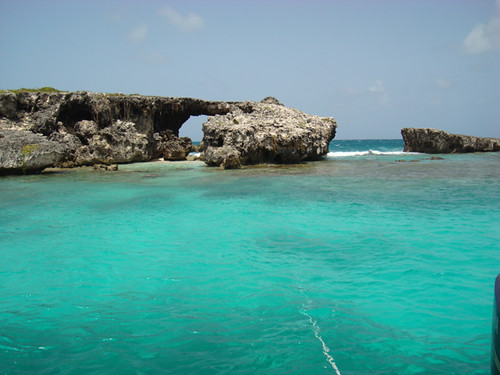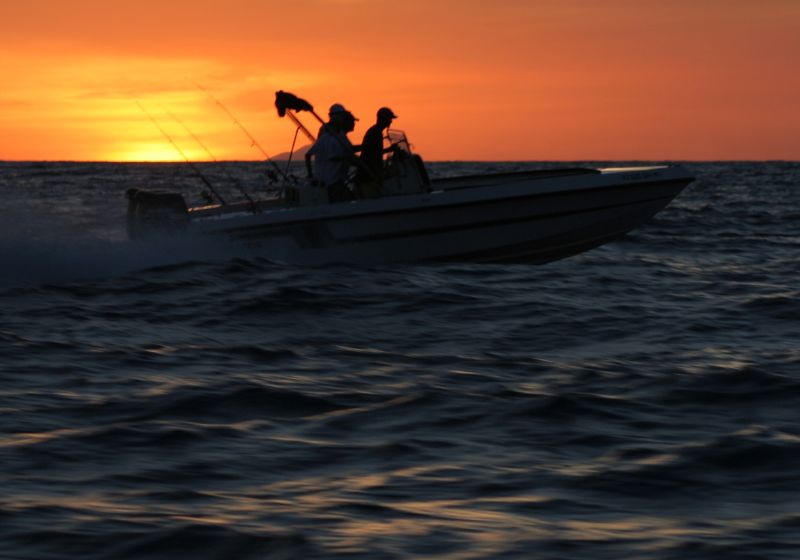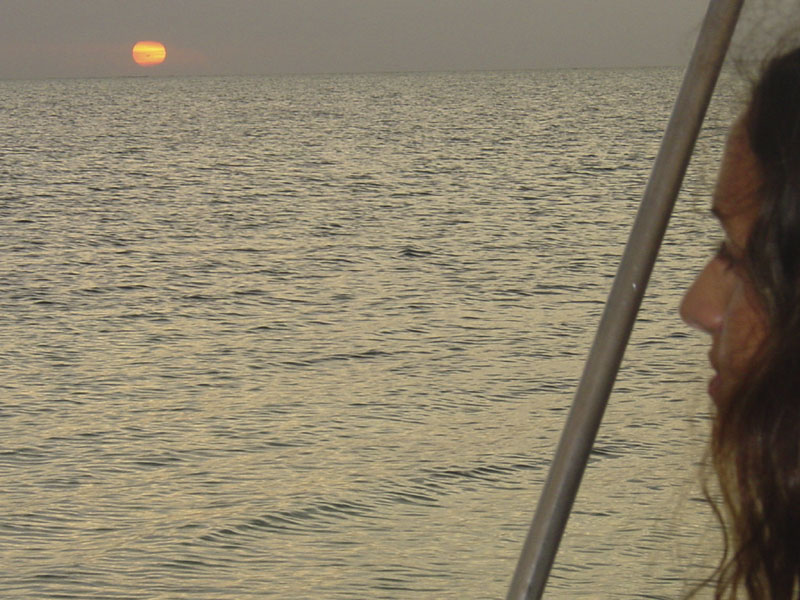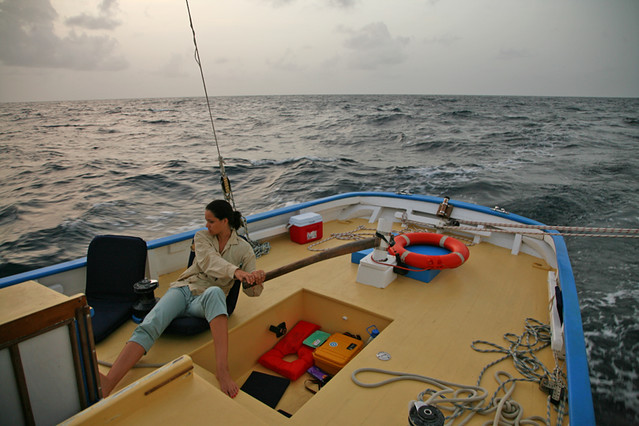The photo above is of my wife on the helm of our boat during a July holiday trip 200 miles over to the British Virgin Islands. As you can see even far off shore the skies were full of dust.
This article below was printed in the Enjoy Magazine, published here locally by the Observer Group and Antiguanice.com. I write a piece every two weeks for them. This one was edited down from a blog i did some time ago. I hope you enjoy, but if you want the longer one check this link from my blog written over four years ago:
Over the past week we have been blessed with some of the clearest skies that anyone remembers. Last week I spoke with Shelly Hulford who has been living out on Curtain Bluff's point for nearly fifty years, and she says that in all the years that Montserrat has been "sitting in her living room" she's never seen it as clear as this. Yesterday on our Classic Yacht sailing tour we could see Guadeloupe, Montserrat, Redonda, Nevis and St. Kitts all at the same time. The reason it's been so clear is that we've had light north east winds which have kept the haze to the south of our islands. "Sarah Dust" also known as African Dust comes across the Atlantic every year blanketing the region in haze. Many people think incorrectly that the haze has something to do with Montserrat, but the world's most studied volcano, Soufriere, has nothing to do with it. What happens is that high winds blow massive quantities of dust from western and northern Africa up into the sky. Millions of tons a year of it comes across the Atlantic passing through the Caribbean traveling on the same trade winds that brought the original European settlers here. Since the early 1970s the mass and content of the dust has changed dramatically. Extreme droughts possibly to do with the "green house effect" as well as changing land and water use have resulted in more land losing its vegetation. Of course this results in more dust getting into the air, but that isn't the worst of it. Since the 1970's there has also been a change in the composition of the dust. There is now a variety of pollutants contained inside the dust and many scientists are now attributing much of the decline in our coral reefs to this increase in african dust. It’s quite logical actually because we all know that when coral is covered with silt of any kind in can die, so with african dust filled with pesticides and all the other nasties covering the coral each year, it’s not hard to make the connection. There are so many things killing it off that i think much of it is gone forever. Sadly, i remember when i was a teenager 19 years ago snorkeling on huge coral forests teaming with life. All of a sudden we had a few mega-hurricanes and most of the reef was gone. Many people blame the hurricanes, but the reef's decline wasn't just because of the storms.
It will take more time and study to find out all the negative effects of this increase in african dust, but there is at least one "positive" result. Using satellite imagery, NAOAA predicts when we in the Caribbean will get "african dust surges", and we know days in advance when it will be hazy.
They have done many studies on the effects of the dust on our weather and have concluded without a doubt that increased levels of the dust can hinder hurricane formation. Considering that due to "global warming" we are forecast to have more conducive conditions for extreme hurricane formation, it is also interesting that also due to global warming, the increase in dust helps to deter these storms from forming. The way it works is that the dust doesn’t come across the Atlantic in a constant stream and instead comes in big waves almost like weather fronts. If good hurricane forming conditions and the dust appear in the same area, then water droplets inside the clouds become too heavy when mixed with the dust and fall out of the sky before they get a chance to become huge thunderstorms. The dust kills the storms before they get a chance to turn into hurricanes.
Apart from all of this, the dust also makes a huge mess on clean surfaces including our boats! There is some great reading to be done on African dust, and of course there are many articles on the net about the health effects of the stuff too. For now we can be extra thankful that it's nice and clear out there. Enjoy it while it lasts.
This is a blog set up by Eli Fuller (me) to help keep readers informed and to promote our little country to prospective guests. It's also to make sure that new info about our island is passed on quickly and also to receive feedback on this info. Of course most of the things i write about have themes of ecology and usually have quite a bit to do with my company Adventure Antigua. Make comments anytime you want, but check the site above to book your adventure.
Showing posts with label "african dust" "sahara dust" atlantic dust hurricanes health science reef "dust and reef" caribbean africa. Show all posts
Showing posts with label "african dust" "sahara dust" atlantic dust hurricanes health science reef "dust and reef" caribbean africa. Show all posts
Friday, March 25, 2011
Thursday, July 01, 2010
Purple haze all in the Caribbean......
At various times of the year, the Caribbean can be covered in thick haze which makes it difficult to see very far at all. Many people looking at things like web cams will think that what they are seeing is just a cloudy day, but most of the time in the spring and summer months what they are seeing is haze caused by African dust or the Saharan Air Layer (SAL) as it is called in meteorological circles. Check this photo from today's Saharan Air Layer (SAL) Analysis:
As you can see, the dust coloured in orange and yellow, is covering the eastern Caribbean as it comes over the Atlantic from Africa. I just took a photo on my HTC and uploaded it to my twitter page for you to see the stuff. Click here for that photo. Pro photographers hate this haze as it can make for fairly flat images, but to be honest, that's the least of the problems this dust can cause. I wrote a long detailed blog about it with a pretty good explanation about it all in 2007. Click here to learn more about African Dust in the Caribbean.
Thursday, June 25, 2009
It's hurricane season in the Atlantic again.

Actually it's been hurricane season since June 1st and as is normal, the Atlantic hasn't seen a named storm yet. The very old hurricane season rhyme went like this:
JUNE too soon
JULY Standby
AUGUST come it must
SEPTEMBER remember
OCTOBER all over
I am not sure if in the old days weather was very different, but as long as i have been alive this rhyme has been a month off. June and July in the Caribbean are as described in the Rhyme, but August and September should be grouped together with September being a far more active storm month than any other month.
We have also learned that October isn't totally all over, and if i remember correctly 2 of the 6 hurricanes that we have been hit by since the 1950s hit us in October. Anyway, the ryhme is a good guide when making plans for a sailing cruise through the Caribbean (as i am at the moment). In between storms which can occasionally pass the weather in the summer is the best all year in my opinion with beautifully clear waters and calm seas.
Interestingly, Antigua has only been directly hit by 6 hurricanes since the mid 1950s and I think all six happened in August, September and October. We have had many close calls and even some very bad weather from the cloud bands coming off hurricanes passing well to our North or South as in the case of Omar last year. Sometimes the only storm conditions we get are huge surfing waves which have been pushed in from hundreds of miles away where a passing storm is churning up the ocean.
In my lifetime, the worst hurricane we got was Hurricane Louis or Luis as it has now been called. That was a cat 5 when it hit according to the US Navy base which was here at the time but what was the worst thing about it was the fact that it was moving slowly. We had hurricane force winds for a day and tropical storm force winds or more for nearly two days. Many houses had damage and most hotels did as well. Both my mom's and my dad's houses fared well in that storm proving that if built well, wood can hold up.
Anyway, the first "blimp on the radar" was picked up by one of the super computer models yesterday (read more about these "models" and how hurricane forecasting is done here).
My good friend Steve mentioned on facebook that he had read on Crown Weather that there was something being detected. Here is today's weather discussion on this private weather site. Click here.
"
Interest Area 2: Another area I am closely watching is completely based on the GFS model. An area of impressive looking shower and thunderstorm activity is located over western Africa this morning. The GFS model insists that this convective complex will develop into a tropical cyclone as soon as this weekend. None of the other global models are forecasting development across the eastern Atlantic, so I remain pretty skeptical that it will happen. Also, the GFS model has been doing very poor with tropical cyclone forecasts so far this season in that it has been forecasting false storms and handling upper level patterns very poorly. So with no other real model support, I am pretty skeptical that this will indeed happen.
With that said, the environmental conditions are favorable for development and will remain favorable for at least the next few days. Sea surface temperatures, however, are actually below normal across the eastern Atlantic and this would inhibit development until this disturbance approaches the Lesser Antilles during Wednesday and Thursday of next week where sea surface temperatures rise to above normal for this time of year.
So, with all of this said, there is the possibility of something to watch in the eastern Atlantic this weekend into next week, but I have very low confidence of it actually happening.
"
I also think that it's kinda early for that type of thing. I also think that the massive amount of African dust in the air at the moment will do as it normally does and stop any storm from getting strong. Read more on African dust coming across the Caribbean here. In that blog post there is a link showing how this increased dust levels kill storm production. Interesting stuff. Anyway, I am not cancelling my sailing plans just yet. This time next week i hope to be 200 miles from home in the BVI enjoying Pussers Pain Killers!
Sunday, March 18, 2007
"sahara dust"

So ya...the purple haze from yesterday's post is all here..
This morning the haze isn't as bad as it was yesterday thankfully, but its still there and we won't be seeing Montserrat today on the south side. "Sarah Dust" also known as African Dust comes across the Atlantic every year blanketing the region in haze. Many people think incorrectly that the haze has something to do with Montserrat's, but the world's most studied volcano, Soufriere, has nothing to do with it. What happens is that high winds blow massive quantities of dust from western and northern Africa up into the sky. Millions and millions of tons a year of it comes across the Atlantic passing through the Caribbean traveling on the same trade winds that brought the original European settlers here. The dust reaches the south-eastern part of the usa too. There is loads of info on all of this on the web these days and after googling "african dust" i came across many articles on it. Anyway, what most of them agree upon is that since the early 1970s the mass and content of the dust has changed dramatically. Yesterday there was yet another terrible report about glaciers melting, but equally scary is how the deserts are growing. Extreme droughts possibly to do with the "green house effect" as well as changing land and water use has resulted in more land losing its vegetation. Of course this results in more dust getting into the air, but that isn't the worst of it. Since the 1970's there has also been a change in the composition of the dust. There is now all kinds of pollutants contained inside the dust and many scientists are now attributing much of the decline in our coral reefs to this increase in african dust. It’s quite logical actually because we all know that when coral is covered with silt of any kind in can die, so with african dust filled with pesticides and all the other nasties covering the coral each year, it’s not hard to make the connection. Poor coral! There are so many things killing it off that i think much of it is gone forever. Sadly, i remember when i was a teenager just 15 years ago snorkeling on huge coral forests teaming with life. See the movie Finding Nemo....that's what the reef was like here back then. All of a sudden we had a few mega-hurricanes and most of the reef was gone. Many people blame the hurricanes which were stronger than Antigua had seen in over 2000 years (a fact that i will talk about another time), but the reef's decline wasn't just because of the storms. If you are interested in reading more then bookmark this link on coral and african dust.
I suppose it will take more time and study to find out all the negative effects of this increase in african dust, but there is at least one positive result. Kind of... Using satellite imagery, the NAOAA people predict when we in the Caribbean will get "african dust surges", and we actually know days in advance when it will be hazy. This is an image of dust coming off Africa.
This morning the haze isn't as bad as it was yesterday thankfully, but its still there and we won't be seeing Montserrat today on the south side. "Sarah Dust" also known as African Dust comes across the Atlantic every year blanketing the region in haze. Many people think incorrectly that the haze has something to do with Montserrat's, but the world's most studied volcano, Soufriere, has nothing to do with it. What happens is that high winds blow massive quantities of dust from western and northern Africa up into the sky. Millions and millions of tons a year of it comes across the Atlantic passing through the Caribbean traveling on the same trade winds that brought the original European settlers here. The dust reaches the south-eastern part of the usa too. There is loads of info on all of this on the web these days and after googling "african dust" i came across many articles on it. Anyway, what most of them agree upon is that since the early 1970s the mass and content of the dust has changed dramatically. Yesterday there was yet another terrible report about glaciers melting, but equally scary is how the deserts are growing. Extreme droughts possibly to do with the "green house effect" as well as changing land and water use has resulted in more land losing its vegetation. Of course this results in more dust getting into the air, but that isn't the worst of it. Since the 1970's there has also been a change in the composition of the dust. There is now all kinds of pollutants contained inside the dust and many scientists are now attributing much of the decline in our coral reefs to this increase in african dust. It’s quite logical actually because we all know that when coral is covered with silt of any kind in can die, so with african dust filled with pesticides and all the other nasties covering the coral each year, it’s not hard to make the connection. Poor coral! There are so many things killing it off that i think much of it is gone forever. Sadly, i remember when i was a teenager just 15 years ago snorkeling on huge coral forests teaming with life. See the movie Finding Nemo....that's what the reef was like here back then. All of a sudden we had a few mega-hurricanes and most of the reef was gone. Many people blame the hurricanes which were stronger than Antigua had seen in over 2000 years (a fact that i will talk about another time), but the reef's decline wasn't just because of the storms. If you are interested in reading more then bookmark this link on coral and african dust.
I suppose it will take more time and study to find out all the negative effects of this increase in african dust, but there is at least one positive result. Kind of... Using satellite imagery, the NAOAA people predict when we in the Caribbean will get "african dust surges", and we actually know days in advance when it will be hazy. This is an image of dust coming off Africa.
 Check here for more of these images. They have done many studies on the effects of the dust on our weather and have concluded without a doubt that increased levels of the dust can hinder hurricane formation which is wildly interesting to me. Considering the fact that due to "global warming" we are forecast to have more conducive conditions for extreme hurricane formation, it is also interesting that also due to global warming the increase in dust helps to deter these storms from forming. The way it works is that the dust doesn’t come across the Atlantic in a constant stream and instead comes in big waves almost like weather fronts. If good hurricane forming conditions and the dust appear in the same area, then water droplets inside the clouds become too heavy when mixed with the dust and fall out of the sky before they get a chance to become huge thunderstorms. The dust kills the storms before they get a chance to turn into hurricanes. There are many articles on all of this here if you are interested.
Check here for more of these images. They have done many studies on the effects of the dust on our weather and have concluded without a doubt that increased levels of the dust can hinder hurricane formation which is wildly interesting to me. Considering the fact that due to "global warming" we are forecast to have more conducive conditions for extreme hurricane formation, it is also interesting that also due to global warming the increase in dust helps to deter these storms from forming. The way it works is that the dust doesn’t come across the Atlantic in a constant stream and instead comes in big waves almost like weather fronts. If good hurricane forming conditions and the dust appear in the same area, then water droplets inside the clouds become too heavy when mixed with the dust and fall out of the sky before they get a chance to become huge thunderstorms. The dust kills the storms before they get a chance to turn into hurricanes. There are many articles on all of this here if you are interested.Other issues that you may not think about which are due to the dust have to do with the mess it makes. My boats are covered in brown clay like dust after weekends like this. I know that we will have to clean them tomorrow morning because of this hazy weekend.
 I am glad i don't have to clean sails! Many of the yachts doing crossings come in with dirty sails and even aircraft have trouble on the leading edges of their equipment.
I am glad i don't have to clean sails! Many of the yachts doing crossings come in with dirty sails and even aircraft have trouble on the leading edges of their equipment.My eyes have given me more and more problems over the past few years and i sometimes wonder if it’s due to all the time i spend in the outdoors in contact with this increased dust. According to several studies, an increase in certain diseases can also be attributed to african dust. Great!...another thing to worry about right? If you are one of those people interested or worried about germs...check this out: Sorry:) There is another interesting health report on This one too.
Anyway, there is a hell of a lot interesting info to digest on the whole "Sahara dust" topic and i hope you found it as interesting as i said it would be. It’s a good thing it’s not all negative though. That thing about the hurricanes is gonna make me sleep better in the summer. One of the other cool things that can happen as a result of the dust is the sunsets.
 They even have articles on that. The pics above are of cool dusty sunsets. The satellite one is of dust coming off Africa.
They even have articles on that. The pics above are of cool dusty sunsets. The satellite one is of dust coming off Africa.
Subscribe to:
Posts (Atom)

